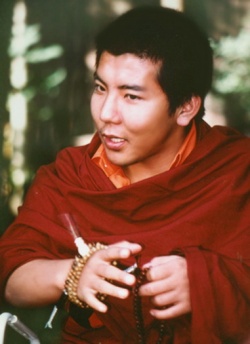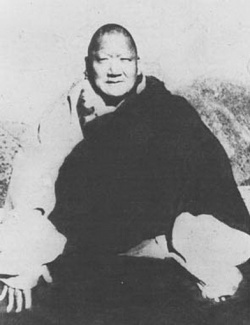Difference between revisions of "Jamgon Kongtrul"
| Line 2: | Line 2: | ||
:''Dont mix up with [[Jamgön Kongtrul Lodrö Tayé]] <br/><br/> | :''Dont mix up with [[Jamgön Kongtrul Lodrö Tayé]] <br/><br/> | ||
| − | '''[[Jamgön Kongtrül]]''', also Jamgoin Gongzhü in official transcription, is a [[name]] of a prominent line of [[Tibetan Buddhist]] [[teachers]] ([[lama]]), primarily identified with the first [[Jamgon Kongtrul]], but also the [[name]] shared by members of a [[lineage]] held by [[tradition]] to be his subsequent [[reincarnations]] ([[tulku]]), to date. | + | '''[[Jamgön Kongtrül]]''', also [[Jamgoin Gongzhü]] in official transcription, is a [[name]] of a prominent line of [[Tibetan Buddhist]] [[teachers]] ([[lama]]), primarily identified with the first [[Jamgon Kongtrul]], but also the [[name]] shared by members of a [[lineage]] held by [[tradition]] to be his subsequent [[reincarnations]] ([[tulku]]), to date. |
The first [[Jamgon Kongtrul]], [[Jamgön Kongtrül Lodrö Thayé]], was one of the preeminent [[scholars]] in 19th century [[Tibet]]. [[Tibetan Buddhists]] believe that he had multiple simultaneous [[emanations]]; only one of these, [[Khyentse Özer]], was called the second [[Jamgon Kongtrul]]. The [[recognition]] of the fourth [[Jamgon Kongtrul]] is presently in dispute, complicated by the ongoing controversy regarding the [[recognition]] of the genuine [[reincarnation]] of the [[17th Karmapa]]. | The first [[Jamgon Kongtrul]], [[Jamgön Kongtrül Lodrö Thayé]], was one of the preeminent [[scholars]] in 19th century [[Tibet]]. [[Tibetan Buddhists]] believe that he had multiple simultaneous [[emanations]]; only one of these, [[Khyentse Özer]], was called the second [[Jamgon Kongtrul]]. The [[recognition]] of the fourth [[Jamgon Kongtrul]] is presently in dispute, complicated by the ongoing controversy regarding the [[recognition]] of the genuine [[reincarnation]] of the [[17th Karmapa]]. | ||
| Line 9: | Line 9: | ||
==The First [[Jamgon Kongtrul]] (1813-1899)== | ==The First [[Jamgon Kongtrul]] (1813-1899)== | ||
| − | The first [[Jamgon Kongtrul]], named [[Jamgön Kongtrül Lodrö Thayé]] (Wylie: [['jam mgon kong sprul blo gros mtha' yas]]) was one of the most prominent [[Buddhist masters]] in [[Tibet]] in the 19th century. He is credited as one of the founders of the [[Rime movement]] of [[Tibetan Buddhism]] and he compiled what is known as the [[Five Great Treasuries]]. He achieved great renown as a [[scholar]] and writer, and authored more than one hundred volumes of [[scriptures]]. | + | The first [[Jamgon Kongtrul]], named [[Jamgön Kongtrül Lodrö Thayé]] ([[Wylie]]: [['jam mgon kong sprul blo gros mtha' yas]]) was one of the most prominent [[Buddhist masters]] in [[Tibet]] in the 19th century. He is credited as one of the founders of the [[Rime movement]] of [[Tibetan Buddhism]] and he compiled what is known as the [[Five Great Treasuries]]. He achieved great renown as a [[scholar]] and writer, and authored more than one hundred volumes of [[scriptures]]. |
==The Second [[Jamgon Kongtrul]] (1902-1952)== | ==The Second [[Jamgon Kongtrul]] (1902-1952)== | ||
| − | The [[15th Karmapa]]'s {{Wiki|biography}} mentions that he had a [[vision]] in which he saw 25 simultaneous [[emanations]] of the [[master]] [[Jamgon Kongtrul]]. Preeminent among these was [[Karsey Kongtrul]] (1904–10 May 1952) ([[Tibetan]]: {{BigTibetan|[[ཀར་སྲས་ཀོང་སྤྲུལ་]]}} Wylie: [[kar-sras kong-sprul]])), who was said to embody [[Jamgön Kongtrul Lodrö Thaye's]] [[mind]]. [[Karsey Kongtrul]] was born as the son of the [[15th Karmapa]]. [[Karsey]] means "[[son of the Karmapa]]"; his formal [[religious]] [[name]] was as [[Jamgön Palden Khyentse Özer]] (Wylie: '[[jam dbyangs mkhyen brtse'i 'od zer]]). | + | The [[15th Karmapa]]'s {{Wiki|biography}} mentions that he had a [[vision]] in which he saw 25 simultaneous [[emanations]] of the [[master]] [[Jamgon Kongtrul]]. Preeminent among these was [[Karsey Kongtrul]] (1904–10 May 1952) ([[Tibetan]]: {{BigTibetan|[[ཀར་སྲས་ཀོང་སྤྲུལ་]]}} [[Wylie]]: [[kar-sras kong-sprul]])), who was said to embody [[Jamgön Kongtrul Lodrö Thaye's]] [[mind]]. [[Karsey Kongtrul]] was born as the son of the [[15th Karmapa]]. [[Karsey]] means "[[son of the Karmapa]]"; his formal [[religious]] [[name]] was as [[Jamgön Palden Khyentse Özer]] ([[Wylie]]: '[[jam dbyangs mkhyen brtse'i 'od zer]]). |
[[File:Jamgon_kongtrul_by_ctr_295.jpg|thumb|250px|]] | [[File:Jamgon_kongtrul_by_ctr_295.jpg|thumb|250px|]] | ||
::Part Four: the Levels in the Three [[Yogas]] | ::Part Four: the Levels in the Three [[Yogas]] | ||
| Line 22: | Line 22: | ||
===Other works published in English translation=== | ===Other works published in English translation=== | ||
| − | • ''The Great [[Path of Awakening]] : The Classic Guide to Using the [[Mahayana]] [[Buddhist]] Slogans to Tame the [[Mind]] and [[Awaken]] the [[Heart]]'' | + | • ''The Great [[Path of Awakening]] : The Classic [[Guide]] to Using the [[Mahayana]] [[Buddhist]] Slogans to Tame the [[Mind]] and [[Awaken]] the [[Heart]]'' |
translated by [[Ken McLeod]], [[Shambhala]], 2000. | translated by [[Ken McLeod]], [[Shambhala]], 2000. | ||
| Line 33: | Line 33: | ||
• ''[[Jamgon Kongtrul's]] [[Retreat]] Manual'' | • ''[[Jamgon Kongtrul's]] [[Retreat]] Manual'' | ||
| − | translated by [[Ngawang Zangpo]]. Snow Lion Publications, 1994. | + | translated by [[Ngawang Zangpo]]. [[Snow Lion Publications]], 1994. |
• ''[[The Torch of Certainty]]'' | • ''[[The Torch of Certainty]]'' | ||
| Line 42: | Line 42: | ||
• ''The Autobiography of [[Jamgon Kongtrul]]: A [[Gem]] of Many Colors'' | • ''The Autobiography of [[Jamgon Kongtrul]]: A [[Gem]] of Many Colors'' | ||
| − | translated by [[Richard Barron]], Snow Lion Publications, 2003. | + | translated by [[Richard Barron]], [[Snow Lion Publications]], 2003. |
• ''[[Sacred]] Ground: [[Jamgon Kongtrul]] on [[Pilgrimage]] and [[Sacred]] {{Wiki|Geography}}'' | • ''[[Sacred]] Ground: [[Jamgon Kongtrul]] on [[Pilgrimage]] and [[Sacred]] {{Wiki|Geography}}'' | ||
| − | Snow Lion Publications, 2001. | + | [[Snow Lion Publications]], 2001. |
• ''Enthronement: The [[Recognition]] of the [[Reincarnate]] [[Masters]] of [[Tibet]] and the [[Himalayas]]'' | • ''Enthronement: The [[Recognition]] of the [[Reincarnate]] [[Masters]] of [[Tibet]] and the [[Himalayas]]'' | ||
| − | Snow Lion Publications, 1997. | + | [[Snow Lion Publications]], 1997. |
• ''The Teacher-Student Relationship'' | • ''The Teacher-Student Relationship'' | ||
| − | Snow Lion Publications, 1999. | + | [[Snow Lion Publications]], 1999. |
• ''[[Essence]] of [[Benefit]] and [[Joy]]'' | • ''[[Essence]] of [[Benefit]] and [[Joy]]'' | ||
Latest revision as of 02:07, 7 August 2014
- Dont mix up with Jamgön Kongtrul Lodrö Tayé
Jamgön Kongtrül, also Jamgoin Gongzhü in official transcription, is a name of a prominent line of Tibetan Buddhist teachers (lama), primarily identified with the first Jamgon Kongtrul, but also the name shared by members of a lineage held by tradition to be his subsequent reincarnations (tulku), to date.
The first Jamgon Kongtrul, Jamgön Kongtrül Lodrö Thayé, was one of the preeminent scholars in 19th century Tibet. Tibetan Buddhists believe that he had multiple simultaneous emanations; only one of these, Khyentse Özer, was called the second Jamgon Kongtrul. The recognition of the fourth Jamgon Kongtrul is presently in dispute, complicated by the ongoing controversy regarding the recognition of the genuine reincarnation of the 17th Karmapa.
The Jamgon Kongtruls are honored as lineage-holders of all the lineages of Tibetan Buddhism, although they are primarily identified with the Karma Kagyu lineage. The Jamgon Kongtruls have had a profound influence on many teachers and masters of the different schools.
The First Jamgon Kongtrul (1813-1899)
The first Jamgon Kongtrul, named Jamgön Kongtrül Lodrö Thayé (Wylie: 'jam mgon kong sprul blo gros mtha' yas) was one of the most prominent Buddhist masters in Tibet in the 19th century. He is credited as one of the founders of the Rime movement of Tibetan Buddhism and he compiled what is known as the Five Great Treasuries. He achieved great renown as a scholar and writer, and authored more than one hundred volumes of scriptures.
The Second Jamgon Kongtrul (1902-1952)
The 15th Karmapa's biography mentions that he had a vision in which he saw 25 simultaneous emanations of the master Jamgon Kongtrul. Preeminent among these was Karsey Kongtrul (1904–10 May 1952) (Tibetan: ཀར་སྲས་ཀོང་སྤྲུལ་ Wylie: kar-sras kong-sprul)), who was said to embody Jamgön Kongtrul Lodrö Thaye's mind. Karsey Kongtrul was born as the son of the 15th Karmapa. Karsey means "son of the Karmapa"; his formal religious name was as Jamgön Palden Khyentse Özer (Wylie: 'jam dbyangs mkhyen brtse'i 'od zer).
- Part Four: the Levels in the Three Yogas
- •Book Ten: An Analysis of the Consummate Fruition State (forthcoming)
- Part One: the Fruition in the Dialectical Approach
- Part Two: The More Common Attainment in the Vajrayana
- Part Three: The Fruition in the Vajrayana
- Part Four: The Fruition State in the Nyingma School
Other works published in English translation
• The Great Path of Awakening : The Classic Guide to Using the Mahayana Buddhist Slogans to Tame the Mind and Awaken the Heart translated by Ken McLeod, Shambhala, 2000.
• Buddha Nature, The Mahayana Uttaratantra Shastra with Commentary Arya Maitreya, with commentary by Jamgon Kongrul Lodro Thaye and Khenpo Tsultrim Gyamtso Rinpoche, Snow Lion, 200.
• Cloudless Sky commentary by Jamgon Kongrul the Third. Shambhala, 2001.
• Jamgon Kongtrul's Retreat Manual translated by Ngawang Zangpo. Snow Lion Publications, 1994.
• The Torch of Certainty Foreword by Chogyam Trungpa. Shambhala, 2000.
• Creation and Completion: Essential Points of Tantric Meditation translated by Sarah Harding. Wisdom Publications, 2002.
• The Autobiography of Jamgon Kongtrul: A Gem of Many Colors translated by Richard Barron, Snow Lion Publications, 2003.
• Sacred Ground: Jamgon Kongtrul on Pilgrimage and Sacred Geography Snow Lion Publications, 2001.
• Enthronement: The Recognition of the Reincarnate Masters of Tibet and the Himalayas Snow Lion Publications, 1997.
• The Teacher-Student Relationship Snow Lion Publications, 1999.
• Essence of Benefit and Joy Siddhi Publications, 2000.
• Timeless Rapture : Inspired Verse from the Shangpa Masters Snow Lion, 2003.
• Light of Wisdom, Vol. 1 by Padmasambhava, commentary by Jamgon Kongtrul, translated by Erik Pema Kunsang, Rangjung Yeshe Publications, 1999.
• Light of Wisdom, Vol. II by Padmasambhava, commentary by Jamgon Kongtrul, translated by Erik Pema Kunsang, Rangjung Yeshe Publications, 1999.
• Light of Wisdom, Vol. IV by Padmasambhava, commentary by Jamgon Kongtrul, translated by Erik Pema Kunsang, Rangjung Yeshe Publications, 2001.
Source

